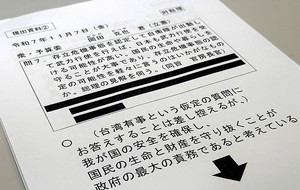Vox Populi, Vox Dei is a daily column that runs on Page 1 of The Asahi Shimbun.
March 4, 2023 at 12:49 JST
 Mamoru Hase, whose son Jun was killed by a teenager in Kobe in 1997, speaks at a news conference in Tokyo on Feb. 14 after appearing before a Supreme Court expert panel discussing how to preserve court records. (Asahi Shimbun file photo)
Mamoru Hase, whose son Jun was killed by a teenager in Kobe in 1997, speaks at a news conference in Tokyo on Feb. 14 after appearing before a Supreme Court expert panel discussing how to preserve court records. (Asahi Shimbun file photo)
I learned that museums follow a principle of “mittsu no mu” (three no’s): no purpose, no limit and no plan.
The principle applies when collecting and storing skeletal specimens of animals and other items, according to “Kirin Kaibo-ki” (An account of anatomization of a giraffe), a book written by the anatomist Megu Gunji.
“Even if something is not needed now, someone may need it 100 years from now,” she wrote. “It is the job of museums to prepare specimens and continue preserving them for that someone.”
Gunji noted that her research of giraffes has been made possible because museums have maintained the thinking that the usefulness of something must not be determined solely by current standards.
Then, how should we think about the recent discovery that court records of high-profile juvenile crimes have been discarded, including the 1997 serial murder of children in Kobe?
The incidents have prompted the Supreme Court to consider how lower courts should preserve those records.
The shortage of storage space is apparently why many records, which should be kept in paper form in principle, have been disposed of.
Even if digitization is approved, officials say scanning records will require considerable labor.
But that does not mean the only solution is to “discard them in principle.” In fact, I disagree.
Court records are public documents that are supposedly the public’s shared assets.
A certain document’s worth may be unknown today, but it could turn out to be a valuable resource years down the road.
I would not insist on storing all records, but I certainly call for preserving a broad range of documents and setting up a system for their effective utilization.
“The responsibility of properly preserving important records and passing them on to posterity lies not only with the courts, but also with society at large,” journalist Shoko Egawa recently said.
I could not agree more. I propose the matter be discussed broadly, hoping that it will benefit someone 100 years from now.
--The Asahi Shimbun, March 4
* * *
Vox Populi, Vox Dei is a popular daily column that takes up a wide range of topics, including culture, arts and social trends and developments. Written by veteran Asahi Shimbun writers, the column provides useful perspectives on and insights into contemporary Japan and its culture.




















A peek through the music industry’s curtain at the producers who harnessed social media to help their idols go global.
A series based on diplomatic documents declassified by Japan’s Foreign Ministry
Here is a collection of first-hand accounts by “hibakusha” atomic bomb survivors.
Cooking experts, chefs and others involved in the field of food introduce their special recipes intertwined with their paths in life.
A series about Japanese-Americans and their memories of World War II